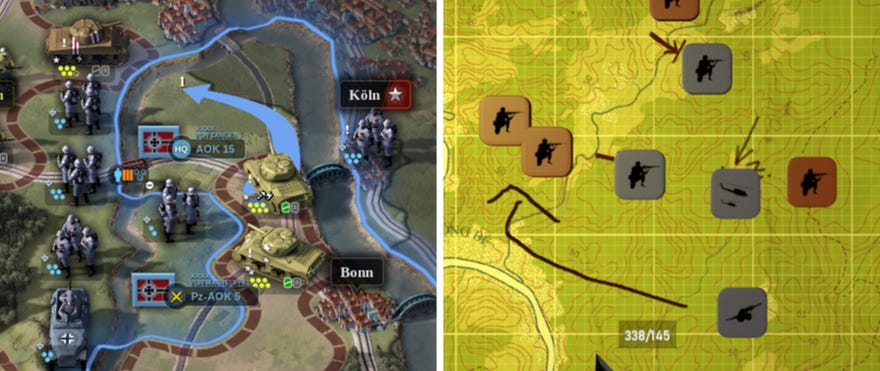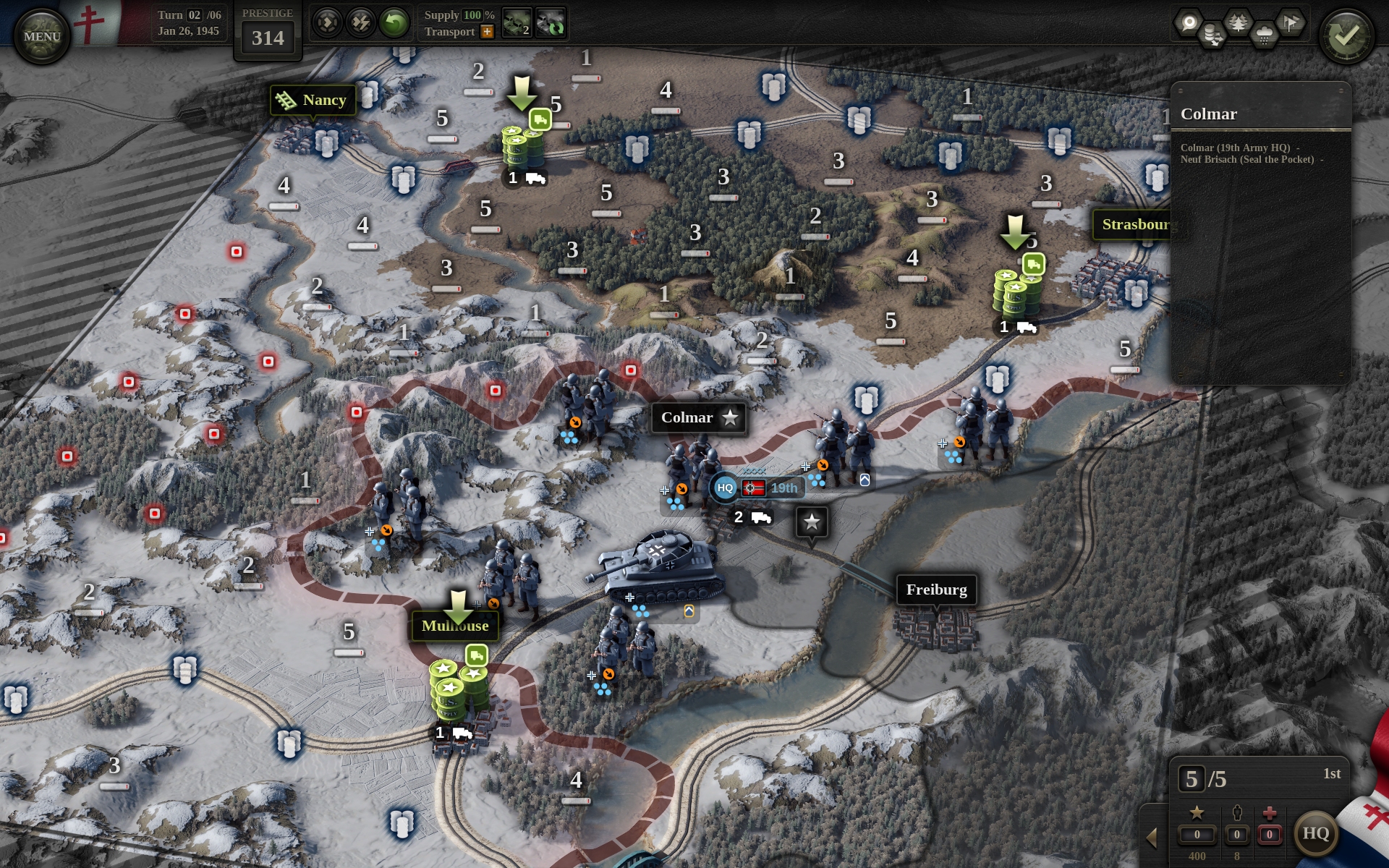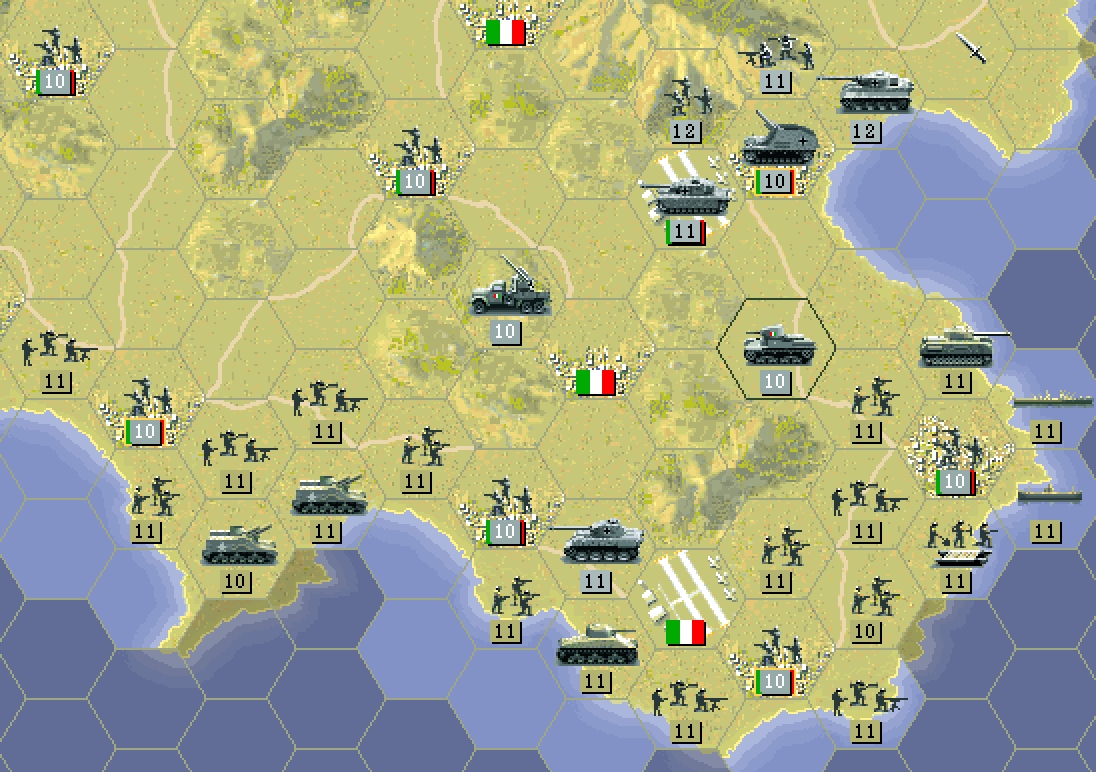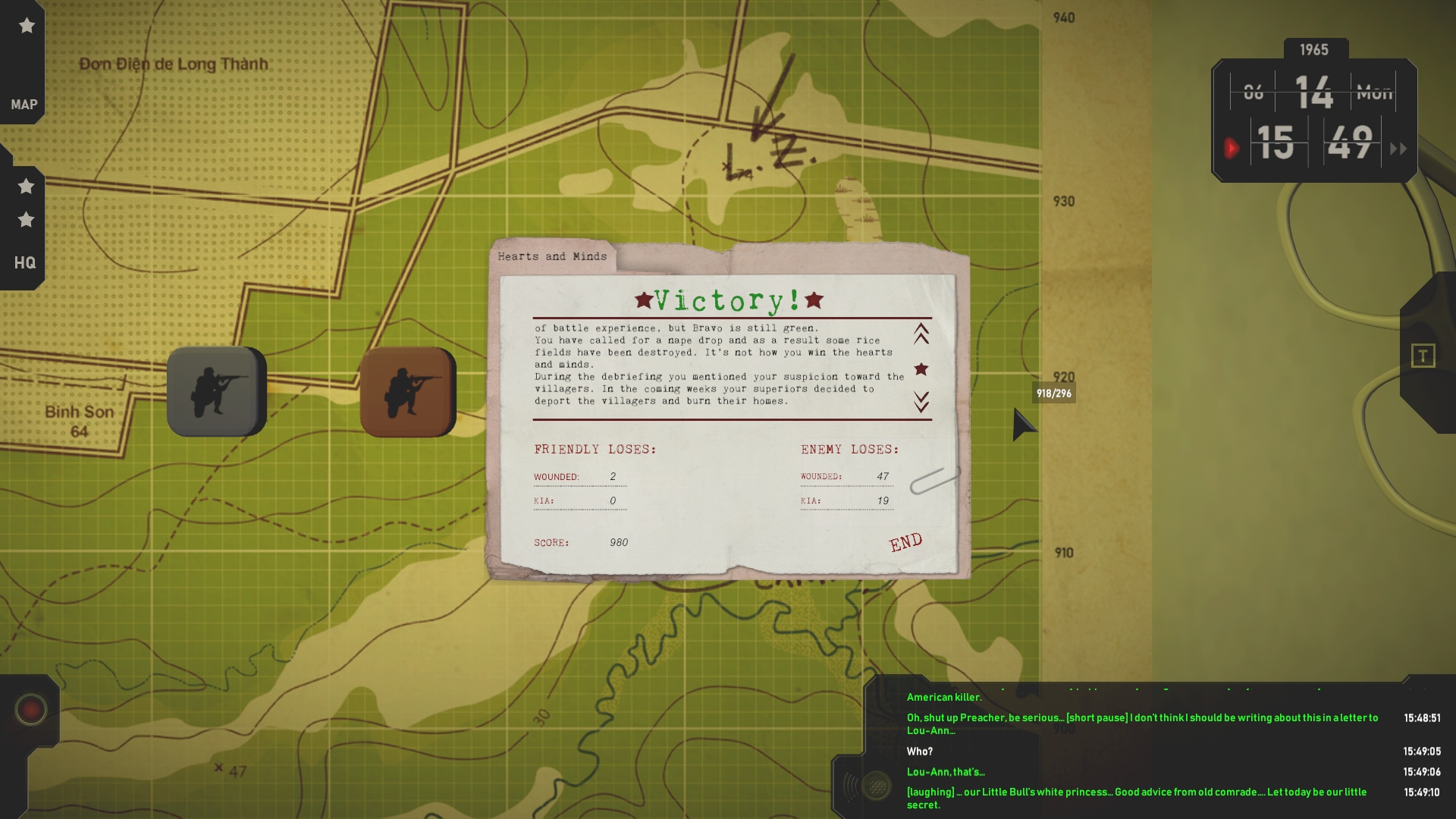The Flare Path: Fogbound
Veiled victories
When it comes to theme, structure, and expectations, the two upcoming wargames Flare Pathed below have flip-all in common. Unity of Command II, the highly anticipated sequel to a WW2 wonder that managed to be handsome, historical, friendly and fierce, is hexy and turn-chopped, a refined relation of that great populariser, Panzer General. Radio Commander, on the other hand, is a real-time enigma, a Vietnam War battle sim that has no obvious antecedents... nothing to live up to. If there is a common thread it's a fog-bejewelled one. Both games blindfold enthusiastically. Fog of War gathers in their map hollows like spilled milk.
I'm not sure what to make of yesterday's unexpected partnership announcement (2x2 are now working with fellow Croatians Croteam to “make Unity of Command II the best wargaming title to date”) or the fact that Tomislav Uzelac sidestepped the questions I put to him about UoC2's surprisingly long gestation and 2x2's current composition. Hopefully, the collaboration and the silence* indicate busyness only. With a release date finally announced (Q3, 2019) the pressure must be rising in Zagreb. The dev diaries that have emerged at regular intervals over the past four years and the answers and images arrayed below certainly suggest that all is proceeding swimmingly and we're in for something truly exceptional this autumn.
*And the poorly picked trailer footage. I very much doubt Vickers Wellesleys will appear in UoC2.
RPS: Of UoC2's new mechanics - Fog of War, HQs, supply hubs, airborne ops etc - which one is most transformative, tactically speaking?
Tomislav Uzelac: Fog of War, without any doubt. It gets pretty scary when you combine FoW with a capable, non-passive AI. Because a naïve version of FoW leaves you completely in the dark as the commander - much more than was the case historically, I believe - once we’ve hidden all the enemy units behind FoW, we expose select enemy information to you. For example, locations of enemy supply networks and HQs are made fully known. There are also active intel measures you can take, like air recon or interrogating prisoners.
On top of everything, because intel is an HQ function, FoW ties into overall campaign progression. With every HQ upgrade, you can choose whether you want to add more intel or some other, say operational or engineering capability. It’s a trade-off that’s relevant both to your style of play, and the campaign at hand. It’s a deep decision, I think.
RPS: “Puzzle-like” is a phrase that crops up fairly often in forum discussions about the original UoC. Do you expect to see it in UoC2 discussions too?
Tomislav: I have to admit I am not impressed by the whole “puzzle game” take. Just about every game can be a puzzle if you choose to pursue 'brilliant victories' all the time (or some other form of maximum score). It’s entirely what you make of it in that respect.
We are at least partly to blame though, because the simplistic UoC1 campaign didn’t give the player enough of a feel of progression and continuity*. So once you’ve played through the content, and you’ve got the hang of the system, the game sort of lets you down because there’s little left to do other than optimize (i.e. go for brilliant victories).
*UoC2 won't fetishise objectives the way its predecessor did - “The player doesn’t have to take all bonus objectives and has a decision to make: some objectives provide interesting toeholds for future battles, other give handy intel and supply bonuses. Capturing all of them might still be sort of possible, but it’s definitely not the optimum thing to do in the campaign.” It should splice together scenarios better too - “Not only do you earn prestige, but the end situation in one battle will determine your position at the start of the next. The exact front lines won’t be 1:1, but key areas like objectives and bridgeheads will generally carry over.”
RPS: Why did you decide to make UoC2's campaign an Allied one and begin it with Operation Torch?
Tomislav: We did not produce an Allied campaign for UoC1 because the game design was very specific to East Front, narrowly focused on that specific kind of manoeuvre warfare. I always wanted to cover the Allied campaigns of WWII, but I felt that the system needs to be expanded and redesigned first.
Once we’d done the redesign (some changes are still ongoing), headlining with the Allied campaign comes naturally. Our Allied campaign starts with the 1942 Torch landings, and that gives us a mostly natural difficulty progression. For that reason, the British Eighth Army only joins the campaign in Tunisia in 1943, so we don’t get a big complex battle like 2nd Alamein right at the start.
RPS: Will people who come to UoC2 with extensive knowledge of events like Operation Market Garden and the Battle of the Bulge have an advantage over those whose grasp of WW2 history is less firm?
Tomislav: This is what we aspire to, and it does work that way in a lot of cases for UoC1. It’s not always perfect though. Regarding the operations you’ve mentioned - we recently tested Bulge from the German side extensively and it was blast, so the omens are good.
There are no guarantees Market Garden will be smooth at our scale though. We’re actually still undecided whether it should be a scenario in itself, or a bonus action at the end of a longer (Advance to Antwerp, say) scenario. We’ve always had cases like that - when an operation is not a natural fit for the system, we have to try to compensate with scenario design.
RPS: How does UoC2 uphold "The Difficulty Compact"?
Tomislav: For starters, there are difficulty levels. We use a form of gradually increasing AI skill, combined with other methods like tweaking prestige rewards and reinforcement costs. On top of that, the game now has bonus objectives and entire (optional) what-if campaign branches, so there’s an element of self-selection of difficulty in there as well.
We are also trying not to front-load all of the game’s mechanics, instead working them in gradually as we go along. As an example, while expanding your supply network is an important aspect of the game, early scenarios all have supply pre-positioned, so learning that particular mechanic can be left for later.
RPS: Should history cherishers be alarmed by talk of more 'what if' content?
Tomislav: I think what-ifs are the most natural thing in wargaming. This is why we do it, otherwise why not just go and read a book? So we’re planning a lot of what-if content, much more than in UoC1. I want to make it clear though: going into what-if content is entirely up to the player. You can, and probably will, complete a fully historical campaign first.
As an example, the “Ljubljana Gap” is the one of the what-ifs we already looked at internally, not in the least because it passes by close to where we live. This is a really difficult track for the Allies, and clearly a bad choice historically. But sometimes that’s the whole point of playing it out - just to see for yourself.
RPS: Does your divisional approach mean certain WW2 battles and theatres are unlikely DLC subjects?
Tomislav: It’s mostly the Pacific island campaign that looks like a non-starter. Other than that, the new map editor can bail us out for almost anything. As an example, the Normandy landings scenario has such a high unit density that you simply can’t fit all the units on the map. However, with our new editor tools it’s easy to create a Normandy map in higher zoom - so we chose a zoom level that lets us fit all the units, but still does not break the system.
The tools in general are pretty cool. We’re going to ship the scenario editor at release time, with Steam Workshop support. The map editor is kind of a beast, so the plan is to only get it out in one of the later updates. We’ll try sooner rather than later.
RPS: I know Panzer General was a formative game for you. Why did it get under your skin?
Tomislav: Well, Panzer General was the original gateway drug to wargaming for many, I don’t think I’m exactly alone there. The barrier to entry is practically non-existent with PG. You get a lot of fun, some challenge and plenty of historical flavor, all in one package. What’s not to like?
I take quite some pride in UoC1 being mentioned in a similar context, especially when it comes to accessibility. So, if you played the original, you should be able to dive straight into UoC2 and simply learn any new mechanics as you go. And if overall it helps introduce a few more non-wargamers to the genre, all the better obviously. I'd love it if UoC2 introduced more people to wargaming.
RPS: Is the imminence (?) of Panzer Corps 2 a spur, an annoyance, or an irrelevance?
Tomislav: I see what you did with the question mark there. We follow what they do, we read their dev diaries. It looks to me they’re doing a good job, and I say that as someone who can probably best relate when it comes to development progress.
I like it that, between us and Panzer Corps 2, the standards of presentation go up. Wargamers deserve nice things. Ideally, the cost and complexity of development will go down so that even the most niche games will be able to enjoy a sweet presentation like this.
RPS: Thank you for your time
* * *
You can shake them and shout at them all you like but Radio Commander's unit counters will never wake-up... never scamper about the way computer wargame counters have been doing for decades. An intriguing turnless Vietnam War command sim currently in development in Poland, RC features incredibly indolent unit chits not because Serious Sim couldn't be arsed to code movement or AI routines but because the pins, flags, and crayoned symbols that adorn genuine military cartography tend to be a bit lacking in get-up-and-go too.
Judging by the three mission press demo I've been dabbling with this week, a major component of RC's challenge will be ensuring the intentionally primitive/static paper and cardboard battlefield picture set out on the trestle table in front of you is accurate. A significant portion of your mission time will be spent requesting information from faraway fighters, then using that information to modify the map.
Like a real HQ-bound CO you're forced to choreograph at arm's-length with imperfect, short shelf-life intel. Unlike a real HQ-bound CO, at present you don't have to struggle with unreliable communications, wilful subordinates and lengthy order implementation delays. A missed trick? Possibly.
All friendly units respond almost instantly to sitrep and support requests, and movement and rules of engagement-related orders. A sensible UI compromise means you don't have to end each move/fire order with a typed or spoken* coordinate (clicking on the map is enough) but the conveniences pretty much end there. Miss the little radio pulse graphic that accompanies incoming “We are here” or “The enemy is there” reports and any counter adjustment will involve a fiddly manual grid check.
* Voiced commands are possible
In the first of the trio of demo missions I shepherded a single platoon as it conducted an intel gathering, 'hearts and minds' village visit. In the second there was a hilltop to be held with two platoons while nearby casualties were choppered to safety. The third scenario was full-on Alamo - a brutal hold the fort task that only constant calls for air and arty support made even faintly winnable.
Obviously, as you're miles away from these actions relying wholly on subtitled radio transmissions for drama as well as direction, it's pretty important that the radio transmissions bolster the Vietnam War illusion rather than undermine it. The demo suggests that Serious Sim will have to pull their socks up in the writing department during the next six months if RC is to do justice to its well-documented theme. As things stand the dialogue sometimes feels more Tropic Thunder than Full Metal Jacket. Incidental exchanges obviously intended to humanise combatants and provide historical context are often too clumsy and cliché-ridden to fulfil their remit. Given a choice between swirling static and unconvincing banter I think I'd prefer swirling static.
To close on a more positive note, the little I've seen thus far has persuaded me that Radio Commander will be able to deliver tension and chaos in a way that more explicit wargames can't. Waiting on tenterhooks for engagement outcomes… realising that you've accidentally napalmed a friendly platoon... prepare to be disempowered and disoriented in ways you've never been disempowered and disoriented before.
* * *

















